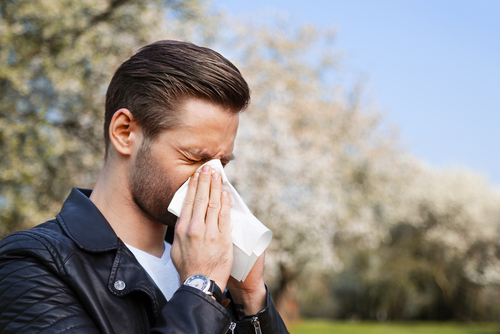
Have you ever experienced burning, irritation, or scratchiness in your eyes? Did it make you wonder if you have dry eyes or allergies?
Dry eye and allergies are two of the most common conditions that can affect our eyes. Since they share some of the same symptoms, it can be difficult to tell them apart.
Also, it is possible to have both conditions at the same time, which makes both worse. Can’t take another day of dry, itchy eyes? Keep reading to learn the differences between allergies and dry eye and how we can help!
Dry Eye
There are many parts that make up the tears in our eyes. They are not only made of water. The three components of tears are water, lipids, and mucin.
People get dry eyes if they are missing any of the important components that make up tears. The outer layer of a tear is the lipid, and it makes sure that the tears do not evaporate or spill over the lid boundaries.
At the edge of the lids, there are glands called Meibomian glands, and they produce the lipid layer of a tear. Most of the time, dry eye is because of a reduction in the lipid layer.
Some medical conditions can cause dry eye as well. The main symptoms of dry eye are burning, redness, a sandy/gritty feeling and reflex tears.
Allergies
Allergies can also cause red eyes and tearing but the main symptom is itchiness. Eye allergies happen when the eyes develop a sensitivity to an element. This is not usually harmful.
If your eyes come in contact with allergens, histamine gets released. Histamine causes swelling, redness, and itching.
Most eye allergies are environmental like dust mites, pollen, cat dander and more. Though rare, there are other eye allergies that can become dangerous.
Treatment
Treatment depends on the cause of the irritation; is it dry eye or allergies? If you have dry eye, the focus is on treating your meibomian glands. This may be by using tear lubricants, as well as addressing any inflammation.
With allergies, the main treatment is using anti-histamine against your mast cells. Antihistamine stops the mast cells from releasing histamine. Other treatments include avoiding allergens (if possible), cold compress and synthetic lubricants.
If you wear contacts, your eye doctor may decide to change you to something more moisturizing. Wearing contacts can dry out your eyes, making any allergy symptoms worse.
Most patients with allergies have the best results using daily disposables. These lenses are more resistant to drying out.
If your eyes continue to bother you, you can try over the counter products. These are usually something like artificial tears. Artificial tears are great in the short term since they restore moisture.
The problem, of course, is they can’t treat the underlying problem. If you suspect that you have dry eye or allergies affecting your eyes, see your eye doctor! They can help you come up with a treatment plan that will treat and fix your dry eyes.
Need to make an appointment to treat your dry eyes, once and for all? Contact Minnesota Eye Consultants in Minneapolis, MN to schedule an appointment today!









